William Peter Blatty is known for one of the most frightening and timeless books (and films), The Exorcist; however, the author harnessed a truly wide range of influences, including comedy, to bring readers a diverse oeuvre that many a horror fan might not be aware.
In fact, before the success of The Exorcist, Blatter had built up a body of work in the world of Hollywood for comedy writing, including working on screenplays that would be adapted into films like A Shot in the Dark, The Great Bank Robbery, Darling Lili, and more.
After The Exorcist, Blatty became the preeminent force in the realm of spiritual horror even though it’s well-documented that the author wasn’t keen to wear the label.
He struggled with being encouraged to write more like The Exorcist, including declining his publisher’s offer to write a sequel (though he would eventually write a successor, including the screenplay), yet continued to explore the limits of what he could conjure onto the page.
Blatty was a master of many genres, and also remains a great reminder of how creativity doesn’t always occupy the same residence; it needs to move, travel to different genres, and occupy fresh ideas.
Let’s look at six books from William Peter Blatty’s impressive body of work.
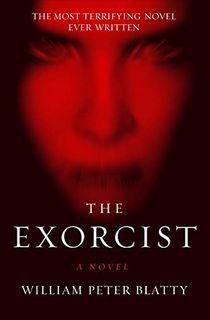
The Exorcist
Of course, we all know The Exorcist.
A timeless horror, often described by readers and viewers everywhere as so frightening it might even be cursed, The Exorcist is a harrowing tale of demonic possession.
Inspired by a case Blatty had heard about while attending Georgetown University, he decided to set it in Washington DC.
Regan MacNeil and her mother, an actress, anticipate the production of a new film and rent a house nearby. Regan begins to exhibit odd behavior, to the point where outside help in the form of multiple priests must come in and attempt to save Regan from a benevolent force that has been invited into her body.
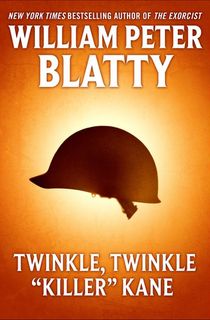
Twinkle, Twinkle "Killer" Kane
Time for some heady stuff. Originally conceived of as Twinkle, Twinkle “Killer” Kane and later revised extensively to become The Ninth Configuration, Blatty flexes his philosophical chops in this wild thriller.
The setting is a castle used as a US government military asylum where 27 patients, all of them officers, have suffered a mental breakdown.
A psychiatrist Colonel Vincent Kane is brought in to try to understand what happened. Blatty turns the volume up by making the motivations multi-faceted like the best that conspiracy theories have to offer.
The reader is left to wonder throughout what caused the mental break, or if they are all faking their condition.
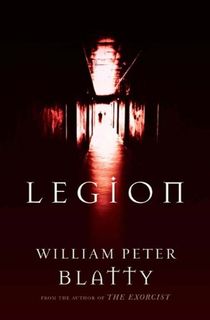
Legion
Legion is the “sequel” to The Exorcist that Blatty inevitably decided to write after initially being against the idea of following up the original.
In Legion, Lt. Kinderman (who readers may remember from the original) is investigating the case of a young boy murdered and crucified along with other mutilations including one involving a priest.
He may be in over his head with this one but is determined to find the killer, whoever or whatever it is. Of course, the latter is the more likely, and soon he begins to find connections between the murders and that of Regan MacNeil’s possession seemingly (not so) long ago.
The book would later become the source material for the third movie in the series.
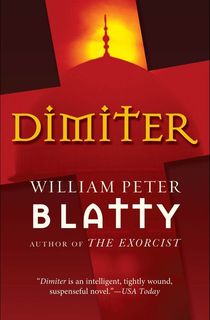
Dimiter
Blatty roams into more supernatural mystery territory with the novel Dimiter. Often compared with the aforementioned Legion than Blatty’s masterpiece, Dimiter casts this complex tale amid a fascinating and foreign setting, 1970s Albania.
Dimiter is a prisoner who withstands almost inhuman amounts of torture from his captors before breaking free. Dubbed an “an agent of Hell,” he sets out on a mission that only he can complete.
Meanwhile, a policeman investigates a series of odd deaths that leave many baffled and more than a little creeped out. Blatty layers multiple narratives to create a super-worldly tale that can best be described as the author trying to bend the narrative in a way he’s never seen before.
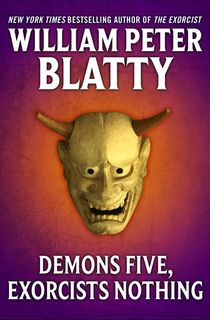
Demons Five, Exorcists Nothing
Demons Five, Exorcists Nothing is a sly, more personal tale of horror from Blatty. Here readers are introduced to a screenwriter who experiences the gamut of success and failure in Hollywood.
It’s also a fable drawn from Blatty’s own experiences, and thus it enters more darkly comic territory than outright horror. The personal hell therein is that of a screenwriter named Jason Hazzard facing abject failures, and multiple projects that end up being flops.
It’s one of those situations that nearly anyone would dream of, to find success, yet once there, only the “lucky” few experience the harsh lesson of how easily it can be to fall.
Demons Five, Exorcists Nothing from the title alone suggests Blatty poking fun, a comedic edge he had been forced to lose after the success of The Exorcist only to bring it back in this story.

Which Way to Mecca, Jack?
Both books feel like they stand side-by-side yet look at the author and his career from different angles.
In Which Way to Mecca, Jack? Blatty goes autobiographical and starts from growing up as a Lebanese immigrant in America.
In On The Exorcist: From Novel to Film, readers get to see the author on the other side of success, after facing the oft-impossible task(s) of getting a film made.
Together both books help paint the picture of a writer who experienced the full scope of what many writers hope to achieve yet fail to understand might happen along the way (wins and losses, commercial limitations, etc.).
Featured image: Chelms Varthoumlien / Unsplash

